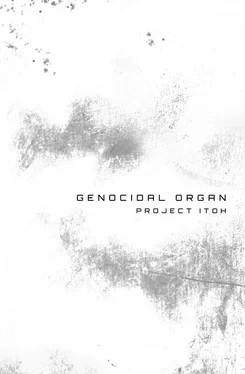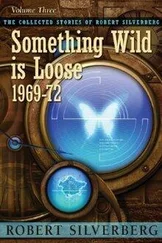Project Itoh - Genocidal Organ
Здесь есть возможность читать онлайн «Project Itoh - Genocidal Organ» весь текст электронной книги совершенно бесплатно (целиком полную версию без сокращений). В некоторых случаях можно слушать аудио, скачать через торрент в формате fb2 и присутствует краткое содержание. Год выпуска: 2012, ISBN: 2012, Издательство: Haikasoru/VIZ Media, Жанр: Старинная литература, на английском языке. Описание произведения, (предисловие) а так же отзывы посетителей доступны на портале библиотеки ЛибКат.
- Название:Genocidal Organ
- Автор:
- Издательство:Haikasoru/VIZ Media
- Жанр:
- Год:2012
- ISBN:9781421550886
- Рейтинг книги:4 / 5. Голосов: 1
-
Избранное:Добавить в избранное
- Отзывы:
-
Ваша оценка:
- 80
- 1
- 2
- 3
- 4
- 5
Genocidal Organ: краткое содержание, описание и аннотация
Предлагаем к чтению аннотацию, описание, краткое содержание или предисловие (зависит от того, что написал сам автор книги «Genocidal Organ»). Если вы не нашли необходимую информацию о книге — напишите в комментариях, мы постараемся отыскать её.
Genocidal Organ — читать онлайн бесплатно полную книгу (весь текст) целиком
Ниже представлен текст книги, разбитый по страницам. Система сохранения места последней прочитанной страницы, позволяет с удобством читать онлайн бесплатно книгу «Genocidal Organ», без необходимости каждый раз заново искать на чём Вы остановились. Поставьте закладку, и сможете в любой момент перейти на страницу, на которой закончили чтение.
Интервал:
Закладка:
“No, that was the impressive thing—it was the will of the Somalian people that brought about an end to their civil war,” Sales answered. “Their troubles started in the 1970s and intensified in the 1990s to the extent that the international community tried to intervene once, just after the first Gulf War. The problem was that the operatives—your predecessors in US Special Forces, if you will—failed, and spectacularly at that. After seeing the battered corpses of his key operatives being dragged ignominiously and very publicly through the streets of Mogadishu, President Clinton decided that Africa was beyond hope and abandoned the whole area to its own devices. After 9/11, Somalia was initially suspected of being a hotbed of Al-Qaeda activity, but that soon died down once the full-scale invasions of Afghanistan and Iraq were underway. In fact, you could go as far as to say that the world at large had thoroughly forgotten about Somalia and its woes.”
The land the world forgot. You could try and publicize its plight online, but you might as well try and push back the ocean for all the good it would do you. There was too much noise, too many layers, and the plaintive cries for help were all but buried. Help us. Help us. The silent death throes of many a country, sinking under the weight of its own plight. No one gave them a second glance.
“But then, in the 2010s, Somalia started to pull itself up by its own bootstraps,” Colonel Rockwell suddenly interjected, and my eyes flicked over toward him to see him grinning. “You’re looking at someone who was actually there on the ground in Mogadishu back in ’93. I was part of Delta Force back then. I remember it like it was yesterday. I was in Bakaara Market when I heard the news of the Black Hawk going down. I’m one of the spectacularly failed predecessors that Ms. Sales refers to.”
“Forgive me, Colonel, I had no idea. Of course. I meant no offense.” Erica Sales put on a show of having the decency to look contrite.
“None taken. In fact, you’re absolutely right. The operation was a spectacular failure. Not so much militarily, as it happens, but certainly a political failure. In any case, I’ve had a keen personal interest in keeping tabs on developments in Somalia ever since. Not that there’s been much I’ve been able to actually do, other than send the odd donation. Anyway, my understanding of the situation—admittedly gleaned from what I’ve observed from afar—is that during the mid-2010s Somalia did indeed, as Ms. Sales suggests, start to drag itself out of the quagmire of civil war, entirely on its own initiative. The AKs and RPGs that had been the weapons of choice were gradually collected up in a general amnesty; civil order and education systems were restored, and the government, police force, and judiciary were rebuilt. The country found a semblance of order where there had been chaos. It’s as if they were determined to prove Hobbes’s theory wrong: that bellum omnium contra omnes , the war of all against all, was not always the inevitable and final result of civil breakdown. And by ‘they,’ I’m talking about one person in particular who was the driving force behind this recovery: a quiet but passionately determined man.”
“And that man’s name was Ahmed Hassan Salaad,” said Erica Sales.
To be honest, I wasn’t surprised when I heard this news. Just saddened a little, though mostly numb. The men who fought oppression on behalf of the weak, children, women, the destitute, and dying—had a habit of transforming into the next generation of oppressor once they had seized power. Power corrupts. It was a common story, and I couldn’t afford to be surprised or affected too much by a common story.
“It wasn’t an easy path, but Ahmed’s group managed to forge a semblance of peace in Somalia for a while. They established a consensus that however poor, however needy, however destitute the country was, there were still fundamental principles that could not be abandoned. Children went to school and learned to read and write. Jerry-rigged armored trucks no longer patrolled the streets at night, and people could sleep peacefully again. Once that basic level of law and order had been established as a fundamental principle, the country could start focusing on its desperate poverty.”
“What sort of natural resources does Somalia have?” asked Williams.
Erica Sales shook her head. “Virtually none to speak of. It is possible that there are some marginal sources of income that remain undiscovered or untapped, but as of the end of the twentieth century there were no significant resources along the lines of oil, ores, or even agricultural products. Investigations were made and surveys were taken, and no potential prospects for an income stream from exports were discovered.”
“They were screwed, in other words,” Williams continued tactfully.
“Not true—not so long as they had their people.” Erica Sales shrugged. “Humans mean human resources, which means potential labor for hire. The UN’s Millennium Development Goals have fostered a reasonably successful track record of seeing underdeveloped, resource-poor countries achieve a level of economic stability. And the African scenery always has significant potential for tourism, given appropriate development of infrastructure. The problem is—”
“—the country was stuck in a messy war for so long that no one wanted to invest, and all the tourists have long since been scared away, huh?” Williams interrupted.
“Just so,” Erica Sales said with an air of finality and looked over at the undersecretary of defense.
The USD nodded and took the stage again. “Thank you, Ms. Sales, for your thorough briefing. We will now proceed to discuss internal matters.”
“Thank you, ladies and gentlemen, for your time and attention.” With that, Erica Sales turned sharply and left the room without further ado. The audience watched the Pentagon style–attired PMC director as she exited.
“Very well, ladies and gentlemen. I will be taking it from here,” the USD said, clearing his throat in such an exaggerated and pompous manner that I had to bite down on my tongue to keep from laughing.
“So, Somalia had experienced some success in its disarmament drive and was making some progress. But the poverty and hardship continued. Some sort of drastic measure was needed to change the world’s attitude toward the country in order to attract some foreign capital. To convince the world that Somalia was once again a civilized country with an educated and willing workforce and a safe place for tourists to visit. After all, all this was true, up until a year ago at least. But it wasn’t enough that it was true—it had to be seen to be true .”
“Public relations, in other words?” I asked.
The USD nodded. “Exactly. Ahmed had studied International Relations at the University of Oxford, and he recognized just how powerful a factor PR was in the creation of Bosnia and Herzegovina out of the ruins of the Yugoslav Wars.”
Hope is a powerful weapon, but exceedingly difficult to wield effectively. Wasn’t that written in some book somewhere? Well, the American people were going to have to believe in Somalia, believe that there was something to be hopeful about, if Somalia were to succeed as a nation. The American politicians in Washington were going to have to believe, as were the news networks. Lobbyists would have to be mobilized. How to achieve all this? Step onto the scene a certain PR specialist who was prepared to take Somalia on as a client.
A press conference was held in Washington. Somalia’s cabinet ministers were trotted out. They were granted an audience with key US political figures. The dire straits of the Somalian economy were impressed upon them. Articles were written for the media. The word got out. And so the wheel started turning, and the powerful weapon called hope started creaking into action—at least, that was how the world was supposed to work …
Читать дальшеИнтервал:
Закладка:
Похожие книги на «Genocidal Organ»
Представляем Вашему вниманию похожие книги на «Genocidal Organ» списком для выбора. Мы отобрали схожую по названию и смыслу литературу в надежде предоставить читателям больше вариантов отыскать новые, интересные, ещё непрочитанные произведения.
Обсуждение, отзывы о книге «Genocidal Organ» и просто собственные мнения читателей. Оставьте ваши комментарии, напишите, что Вы думаете о произведении, его смысле или главных героях. Укажите что конкретно понравилось, а что нет, и почему Вы так считаете.












